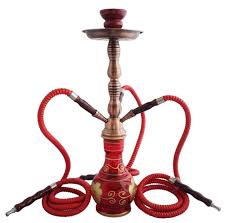By Daniel Kanu
Assistant Politics Editor
Early this year, the Environmental Rights Action/Friends of the Earth Nigeria (ERA/FoEN) raised the alarm on the growing rate of Shisha consumers in the country.
The group advised the government to take a cue from other nations that have banned the importation and smoking of water-pipe tobacco otherwise known as shisha, due to its addictiveness and deadly effect on the health of users.
The World Health Organisation (WHO) has equally warned that water-pipe smokers and second-hand smokers are exposed to the same health risks associated with cigarette smoking.
“Contrary to popular belief, the smoke that emerges from a water-pipe contains numerous toxicants known to cause diseases such as lung cancer, heart disease and respiratory disease,” the UN agency notes in its latest advisory note on water-pipe tobacco smoking.
Although many users, perhaps out of ignorance, think it is less harmful, shisha smoking, according to health experts has many of the same health risks as cigarette smoking.
Research has shown that the content of shisha, like cigarettes, includes nicotine, tar, carbon monoxide, arsenic, lead and other poisonous and cancer-causing chemicals
Despite the marching order by the Minister of Health, Prof Isaac Adewole at the 2018 World No Tobacco Day on strict adherence to the provisions of the National Tobacco Control Act (NTCA), it does not seem as if any proactive step has followed the directive.
Tanzania banned the product on the product in July 2016, while Rwanda started enforcing a ban with effect from December 15, 2017.
Other countries across the globe that have equally banned shisha and shisha bars are Pakistan, Jordan, Singapore, and Saudi Arabia.
A recent study by University of Nairobi found shisha had traces of opiates, and concluded that smoking the product has effects similar to smoking tobacco. Pipe-sharing among users could also lead to the spread of infectious diseases such as tuberculosis and hepatitis.
Akinbode Oluwafemi, ERA/FoEN Deputy Executive Director has asked the federal government to take decisive step in banning tobacco smoking and its related substances rather than treat the issue with kid-gloves.
Also, he urged government to take a cue from what other countries were doing in their efforts to sanitize their health system from tobacco and its related substances abuse.
Said Oluwafemi: “We commend our sister African countries that have taken this bold and life-saving step in banning this toxic product. The Nigerian government must act in like manner to save Nigerian youths who believe that shisha is less harmful and hype”
Oluwafemi explained that studies show that shisha patrons who smoke just one single session of shisha are in reality consuming the content of about 100 or more cigarettes, even as he lamented that while patrons of the product are portrayed as hype, they stand increased risk of heart diseases, cancer, lung disease and many other deadly ailments. Pregnant users also develop problems.
Intensive undercover research conducted by ERA/FoEN revealed that most Nigerian cities like Abuja, Lagos, Port Harcourt, Kano etc., have flourishing shisha bars patronized by the elite, celebrities and supposed role models who not only smoke the product, but also circulate pictures and videos of their shisha orgies on social media, feeling cool and hype.
Also a transporter, Joel Amanze told The Niche that shisha joints were increasing by the day in our cities while government turn blind eye.
Said Amanze “Today, shisha cafés are gaining in popularity around the big cities in the country and government is doing as if nothing is happening.
“Worst still, the Ministry of Health and its stakeholders, despite the instruction of its Minister, Prof Isaac Adewale on the World No Tobacco Day on the banning of tobacco are yet to rise to the challenge of tobacco menace”.
There seems to be a national amnesia about the existence of a tobacco control law in Nigeria.
This is despite the fact that the National Tobacco Control Act (NTCA) was enacted only in 2015.
For instance, Article 9 (1) in the regulation of smoking is quite explicit on the National Tobacco law: that except otherwise provided no person shall smoke tobacco or tobacco products in a residential house co-occupied by person who is below 18, in a try-cycle, vehicle, aircraft, public places etc.
Article 34 of Part XI is dedicated to penalties and applicable fines for violations.
Article 35 allows for search warrants to be procured for inspection of dwelling places suspected of harboring illegal or substandard tobacco or tobacco products.
Although the law has provided a legal framework for the production, importation, distribution, sale and consumption of tobacco in the country its implementation has remained a great challenge.
Some critical observers have expressed displeasure on government’s inability to make NTCA provisions effective.
Social commentator, Nojeem Adetuberu, warned that “The NTCA should not be made to look like another exercise in futility and a legal document gathering dust in law libraries”.
There is no gainsaying the fact that enforcement is very critical to the implementation of a legislation, without which it becomes ineffectual.
Some hold the view that cigarette consumption is a lifestyle and stands contrary to reason to call for its outright ban.
Being a legal product, they argue that the focus should not be on prohibition of the product rather, priority should be accorded to implementing and promoting policies that can ensure the tobacco industry is well regulated.
This they contended will help achieve the intended goal, which includes protecting nonsmokers and underage persons from the risk of smoking, reducing the prevalence of smoking, enforcing smoking regulation and at the same time ensuring the nation benefits from localising production.
But Pastor Peter Giwa of The Divine Church Ministry, Lagos told The Niche that those supporting in any way in letting tobacco and its related products remain in circulation were those that have no regard for the human life as well as those with dead conscience and no morality.
He said only those benefitting from the killer product would canvass for it to remain, stressing that “no amount of intellectual or legal logic or financial gain from it can equate with the life wasted through it. What of the countries that have banned it? Nigeria should join them”.
For Oluwafemi “The tobacco industry will stop at nothing in their quest for more lungs to consume their products. The federal government must act proactively by banning shisha and closing the shisha bars if we do not want our kids to become prime targets to be recruited into smoking. There should be no more delay on this”.
Philip Jakpor,the Head, Media & Campaigns, ERA/FoEN said Tobacco companies have perfected the use of propaganda and marketing gimmick to hoodwink the people but expressed optimism that with sustained enlightenment and mobilization of the citizenry the war against tobacco and related substances like shisha would be won someday.














